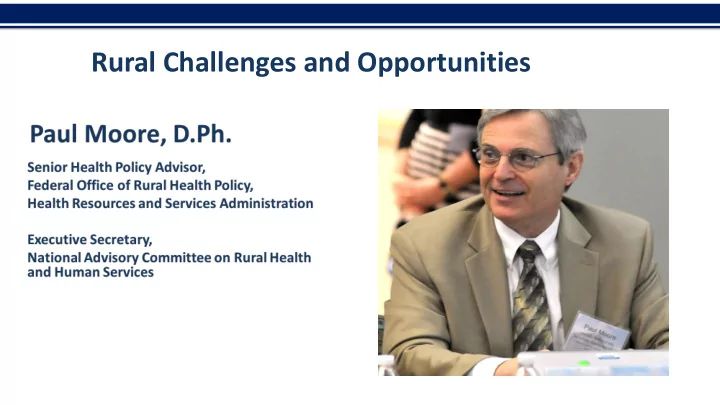

Rural Challenges and Opportunities 1
Rural Population Characteristics 2
Rural Workforce Shortages About 20% of Americans live in rural communities, but only about 7% of oncologists practice in rural communities. Reference: https://www.ruralhealthresearch.org/assets/3403- 13851/020420-cancer-surveillance-ppt.pdf 3
The Rural Safety Net Federally Qualified Health Centers Critical Access Hospitals Rural Health Clinics (FQHCs) (CAHs) (RHCs) 4
https://www.ruralhealthresearch.org/assets/3403-13851/020420-cancer-surveillance-ppt.pdf 5
Background: Rural Cancer Care Healthy People 2020 objectives: …to decrease cancer mortality to 161.4 deaths per 100,000 population • As of 2015, this objective has been met in metropolitan counties. 157.8 cancer deaths per 100,000 • Yet, rural communities have been left behind. 180.4 cancer deaths per 100,000 Source: Henley et al. MMWR Surv Summ . 2017;66(14):1-13. 6
Key Takeaways • Rural -urban disparities in spatial access to cancer care exist. • Travel burden to reach a cancer provider was associated with worse survivorship and treatment initiation. • Current challenges in capturing rural populations with nationwide data may hinder the opportunities to address rural cancer disparities. 7
Policy Implications Need to mitigate potential negative consequences due to long travel distances. o Tele-oncology approaches o Home-based or local hospital chemotherapy o Cancer care delivery training for home health aides, nurses and physician assistants Reference: https://www.ruralhealthresearch.org/assets/3403-13851/020420-cancer-surveillance-ppt.pdf 8
• The Committee is a federally chartered independent citizens’ panel whose charge is to advise the Secretary of HHS on issues related to how HHS and its programs can better serve rural communities. • The Committee members’ experience and expertise cover a wide range of rural health and human services issues. • The Committee meets twice a year to: • Examine important issues that affect the health and well-being of rural Americans.. • To hear directly from rural stakeholders in healthcare and human services. National Advisory Committee on Rural Health and Human Services 9
Why Focus on Rural Cancer Care? • Cancer is the second leading cause of death in the US • Despite a downward decline in national cancer mortality, research demonstrates a distinct disparity in cancer mortality between urban and rural areas • Rural counties have higher mortality rates for several preventable cancers, specifically, lung, colorectal and cervical cancers • Disparities in cancer prevention and treatment in rural areas are attributable to several factors, such as higher rates of poverty, less access to health care services, transportation issues and more dependence on public health insurance programs National Advisory Committee on Rural Health and Human Services 10
Recommendations: 1. Combine federal funding to implement and evaluate a rural patient navigation program; 2. Increase funding for NCI’s Rural Cancer Control Program and related partnerships; 3. Implement a national educational campaign to provide cancer related info to rural providers; 4. Educate rural providers to use Medicare codes to enhance cancer care coordination; 5. Require the assessment of rural-urban disparities and related goals and objectives in state cancer control plans. National Advisory Committee on Rural Health and Human Services 11
Rural Cancer Challenges & Opportunities Cancer is always…. Personal Challenging But we have Opportunity to make it less challenging in rural areas! National Advisory Committee on Rural Health and Human Services 12
Thank You. Paul Moore, DPh Senior Health Policy Advisor Executive Secretary, National Advisory Committee on Rural Health and Human Services Federal Office of Rural Health Policy (FORHP) Health Resources and Services Administration (HRSA) Email: Paul.Moore@hrsa.hhs.gov National Advisory Committee on Rural Health and Human Services 13
Recommend
More recommend